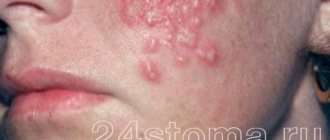Every mother dreams of giving birth and raising a healthy baby. Unfortunately, there are many dangers along the way of pregnancy, and one of them is the herpes virus, which is familiar to many. The virus can manifest itself in different ways: from itchy sores on the lips, poisoning a comfortable life, to the development of serious health-threatening conditions. In pregnant women, relapses can occur especially often, which is due to a natural decrease in immunity during pregnancy. During this difficult period, the expectant mother's immunity levels decrease. This condition is called physiological immunosuppression, which, on the one hand, helps to bear a child without rejecting him, and on the other, makes the body susceptible to various infections. Despite the fact that herpes on the lips is not considered a serious disease by most, herpes viruses can have an adverse and even fatal effect on the course of pregnancy and childbirth, leading in some cases to damage to the fetus.
- Herpes on the lips during pregnancy
- Why is herpes dangerous during pregnancy?
- An important aspect of protecting the body from viruses and germs
- Herpes during pregnancy. Is it possible to resist him?
- How to behave if the disease manifests itself
- How does the virus enter the body and why is it activated?
- Herpes zoster during pregnancy
- Who needs a herpes diagnosis?
- Herpes treatment regimen
- Effects of therapy with VIFERON
Herpes on the lips during pregnancy
The herpes simplex virus (Herpes simplex virus) of the first and second types is constantly present in the body in most people after infection in early childhood and under unfavorable conditions can be activated. It is known that by the age of fifteen, 80% of children and adolescents are infected with one or another herpes virus, and by the age of 30, 90% of people have antibodies to different types of this virus. The most common sites for infection are the genital area and surrounding skin, such as the buttocks, perineum, and face. Single or grouped itchy blisters appear on/on the nose, lips, cheeks, mouth, and on the mucous membrane of the eyelids. Recurrences of herpes during pregnancy are a very common occurrence, since a woman’s immune system during this period may not be able to cope with the virus that has once settled in the body.
In what types does the disease manifest itself?
Cold sores during pregnancy can have several manifestations. Naturally, it does not occur in any form. They can differ noticeably from each other, and ultimately affect both the course of the pregnancy itself and the development of the fetus as a whole.
If a woman expecting a child already had herpes rashes on her lips before pregnancy, then the probability of transmitting this virus to the fetus will be no more than 5%. If a woman did not come into contact with the herpes virus until she became pregnant, and the infection occurred while she was expecting a child, then the probability of a negative effect on the fetus immediately reaches 90%. Here you cannot do without medical help, because a timely response to such a manifestation can save the child’s life.
Doctors divide the existing manifestations of herpes into several types. These include:
- Primary form of the disease. It is carried out at the moment when a woman first becomes infected. It appears when the body does not have antibodies that can fight pathogens. Usually occurs at the moment when herpes on the lips appears for the first time during pregnancy, and the woman has not yet had it.
- Recurrent herpes. Infection occurs even before pregnancy. The disease manifests itself when immunity decreases, and symptoms of the disease appear accordingly. If you conduct a blood test at this time, you can note that there are herpes antibodies in the body.
- Asymptomatic transmission of the virus. In this case, the virus will spread inside the woman’s body, transmitted from cell to cell. At the same time, none of the symptoms of the disease will show themselves. It is possible that even herpes on the lip will not appear during pregnancy, but the woman may be infected.
We recommend reading: Kefir face mask
Why is herpes dangerous during pregnancy?
The greatest danger is posed by primary infection with herpes during pregnancy. Due to the absence of antibodies protecting against herpes in the mother’s body, the situation is characterized by more pronounced manifestations. For the fetus, the risk is especially high when infected with genital herpes in the first and third trimesters. Infection of the fetus in the first trimester leads to severe consequences, but such cases are extremely rare, since with the primary infection of a pregnant woman up to 10 weeks, as a rule, spontaneous termination of pregnancy occurs. The situation is considered extremely unfavorable in the case of primary infection in the second and third trimesters. However, primary infection in the second half of pregnancy almost always has a clear manifestation, which allows immediate action to be taken. HSV, while in the body, certainly reduces the “reserve” of health originally provided by nature. However, in the process of interaction with the virus, antibodies are formed that are passively transmitted to the newborn from the mother. With recurrent herpes or carriage of the virus, the risk to the fetus is assessed as minimal, since maternal antibodies help cope with the infection even in the event of an active relapse. With this form of infection, the virus is released less than with the primary one.
What should pregnant women do?
Considering that the signs of herpes are immediately visible, especially in expectant mothers who have encountered such a disease, it is necessary to immediately begin to eradicate this manifestation. Initially, you should forget about self-medication, because a cold on the lip during pregnancy can be just as dangerous for babies as other diseases of the expectant mother. Only a gynecologist will be able to optimally prescribe treatment, based on what week of pregnancy the woman is in, what the activity of the virus is, at what stage of the disease and what type of virus is in the body.
Many medications are now contraindicated for pregnant women, in particular, this also applies to herpes medications. Therefore, it is necessary to select medications that will help eliminate the manifestation of the disease and not harm the unborn child. There are products that are available in the form of ointments, gels or creams for use on the skin. Tablets and other medications used internally are very rarely prescribed during pregnancy. Popular antiviral drugs are Acyclovir, Herpevir, Zovirax. They are applied to the place where inflammation occurs, and the active substance will not penetrate the blood and placenta, so such medications are suitable for treatment.
It is important to remember that in addition to medications, to fight the virus it is necessary to take vitamins, microelements, strengthen and improve immunity. Then the likelihood of disease and abnormal fetal development is minimized. A large role will be played by adequate and healthy sleep, strengthened immunity, and proper preparation of the diet of a pregnant woman.
The likelihood of herpes can also be minimized if you adhere to the rules of personal hygiene and do not pick off blisters and crusts that have formed. This can only cause more harm to both yourself and the unborn child and become self-infected again. If the disease is detected in time and its treatment is not started too late, it will disappear after a maximum of a week. Afterwards, it is necessary to undergo an ultrasound examination again to make sure that everything is fine with the child; it is also necessary to be under the supervision of a doctor and constantly follow his recommendations.
We recommend reading: Laminaria face mask. Composition, beneficial properties of kelp
An important aspect of the body's defense system against viruses and microbes
In the process of evolution, humans have developed various defense mechanisms that allow them to resist various infections. Thus, the interferon system IFN is one of the most important factors of the body’s resistance, participating in various immunological reactions. Interferons are a group of biologically active proteins or glycoproteins synthesized by the cell in the process of a protective reaction to foreign agents, which include viral infection. Currently, the concept of “interferon system” (SI) has emerged. It does not belong to any specific organ, but exists in every cell, so all of them can be infected with a virus and must have a system for recognizing and eliminating foreign genetic information. SI is configured to recognize “self and foe” and is “built-in” into almost all cells of the body, which allows it to actively influence the entire cascade of the body’s defense reactions from phagocytosis to inflammation, which makes it an important factor in nonspecific resistance. As a result of the study of interferons, their role was determined: control and self-regulation of processes in the body. The main effects of interferon protection: antiviral, antimicrobial, immunomodulatory, preventing excessive cell proliferation, protection against radiation and others. Herpesvirus infections cause an imbalance in the interferon system, inhibit the cellular and phagocytic reactions of the body (prevent the detection, absorption and removal of viral particles). Restoration and normalization of the body’s defense mechanisms is the preventive task of antiviral therapy.
Herpes during pregnancy. Is it possible to resist him?
What can be advised to those who, with the help of approved medications, seek to stop herpes during pregnancy? VIFERON is an antiviral drug that can be taken by expectant mothers. One of its properties is a wide range of antiviral activity due to the presence of interferon in the drug. That is, you can start using it already at the beginning of symptoms. This can stop the disease at the very beginning, while the virus has not yet multiplied and affected healthy cells. Doctors prescribe VIFERON for herpes during pregnancy to compensate for the lack of its own interferon and enhance antiviral protection. Already from the 14th week of pregnancy, VIFERON Suppositories are allowed in a dosage of 500,000 IU. It is prescribed for primary or recurrent herpetic infection of the skin and mucous membranes, with a localized form, mild and moderate course, including the urogenital form of infection.
How to behave if the disease manifests itself
Speaking about household habits, it is worth noting that hand hygiene during a relapse of herpes is very important. Do not touch the affected area with your hands, because the infection can be transferred from the face to the genital area. Infection of the birth canal before childbirth may lead to a caesarean section. Herpetic infection in pregnant women requires mandatory treatment under the supervision of a specialist. If a pregnant woman is surrounded by someone with signs of infection, close contacts should be avoided: kissing, sex, and you should not share dishes, linen, or towels with the patient.
Prevention
The main measures to prevent herpes in pregnant women are:
- testing for the herpes virus when planning to conceive (before you become pregnant)
- rejection of bad habits
- strengthening the immune system (hardening, balanced nutrition, physical activity and healthy lifestyle in general)
If you know about your recurrent herpes, you need to be treated before pregnancy with multivitamin complexes and immunomodulatory drugs as prescribed by your doctor. Laser therapy may also be recommended to help make the virus less active. You should also avoid contact with those who have recurrent herpes. Health to you and your baby!
How does the virus enter the body and why is it activated?
Of the eight types of herpes viruses known today, the cause of rashes on the lower part of the face and genitals are usually HSV-1 (mainly herpes labialis) and HSV-2, which has more dangerous consequences. Transmission of HSV-2, as a rule, occurs through sexual intercourse, but vertical transmission is also possible - from mother to child during childbirth. Moreover, if a pregnant woman is infected for the first time, then the risk of neonatal herpes in the baby is 50 to 50, and in case of relapse, only 3-5% of children are born with signs of herpes infection. With the vertical mechanism of infection, the fetus is infected through maternal blood during childbirth, or the virus enters the pregnant woman’s uterine cavity from the cervix. At the same time, a high level of immunoglobulin proteins in the blood (antibodies) can protect the fetus from intrauterine infection. Cellular immunity also plays an important role in preventing the recurrence of herpes. In turn, the frequency and intensity of relapses depends on the state of local (mucosal) immunity. When there is a malfunction in the immune system, there are exacerbations of herpes infection. Injuries, surgeries, cosmetic procedures, sexual contacts that injure the mucous membrane, and taking certain medications can trigger a relapse. With reduced levels of T-cell immunity, conditions are created for the virus to multiply in cells. Interferon deficiency plays a significant role in the pathogenesis of herpes. In foci of herpetic lesions, local suppression of interferon formation is noted. VIFERON for herpes during pregnancy in the form of Suppositories can be taken starting from the 14th week, however, local forms such as Gel and Ointment have no restrictions on the duration of pregnancy. They are used directly on the affected areas: skin and mucous membranes.
Causes and symptoms
Infection with HSV-1 occurs mainly in the first years of a person’s life through oral contact (through kissing).
In most cases, the disease has a chronic course with asymptomatic periods of varying duration and pronounced relapses.
Exacerbation of herpes occurs against the background of weakened immunity.
In pregnant women, the body's protective factors are weakened, so they become more vulnerable to the viral agent.
Symptoms indicating activation of HSV-1 and the manifestation of herpes infection are difficult to confuse with signs of another pathology. During the period of exacerbation, the development of the disease occurs in several stages. Each of them is characterized by certain symptoms:
- The appearance of itching, burning or tingling sensations in the lip area.
- Formation of a red spot on the lips.
- The formation of bubbles with a diameter of 1-2 mm on the reddened area of the skin, filled with transparent contents that gradually become cloudy. The itching sensation in the area of the rash persists.
- Ulceration of the vesicles, which is accompanied by the release of exudate and the formation of small erosions.
- 3-5 days after the first symptoms appear, crusts form on the erosive surface, which, if their integrity is violated, bleed and cause pain.
- Gradual extinction of pathological symptoms, healing of affected skin areas.
The average duration of relapses of labial herpes is 7-9 days. In some patients, the appearance of rashes on the lips may accompany an acute respiratory illness or runny nose.
Herpes zoster during pregnancy
Herpes zoster (herpes zoster, herpes zoster) is a viral disease of the skin and nervous tissue that occurs due to reactivation of the herpes virus type 3. Primary infection with the Varicella-zoster virus usually manifests itself as chickenpox. People with immunosuppression have a much higher risk of getting the disease than those with normal immunity. The main symptom is severe, prolonged pain, which may precede the rash. Pregnant women may experience severe complications. Infection in the first trimester will most likely lead to primary placental insufficiency and miscarriageii.
Avoiding illness
To ensure that herpes infection does not become something unexpected, it is necessary to adhere to certain preventive measures, and they must be started before conceiving a child. These rules include:
- Donating blood for analysis and detection of herpes.
- Constant observance of personal hygiene rules.
- The right approach to planning a child, given that both parents must undergo a full examination.
- Maintaining immunity at a high level.
- Timely treatment of infectious and viral diseases.
- Hardening.
- Minimizing bad habits or completely abandoning them.
Diagnosis of herpes, who needs it
When planning a pregnancy, it is recommended to be tested for this infection, which is dangerous for the fetus, since herpes can have an atypical form, in which there is no itching and burning, and there are no vesicles. The reason for diagnosis may also be a history of herpetic rashes of any localization, erosive or vesicular rashes on the skin, buttocks, thighs, mucopurulent discharge from the vagina, or sexual contact with a partner who has this disease, as well as frequent changes of partners. Particular attention is required for women with a burdened obstetric history, those who have already suffered perinatal losses or have given birth to a child with congenital defects. Pregnant women with signs of intrauterine infection determined by ultrasound should undergo testing.
What is herpes? Types of infection
The disease is incurable. The virus can “sleep” in the body for years. But, as soon as for some reason the body’s defenses weaken, the clinical picture of the disease will appear. There are 2 types of herpes virus:
- HSV-1 (so-called labial)
- HSV-2 (genital: rashes appear on a person's genitals)
The second type of herpes is very dangerous for those who are pregnant. This is a TORCH infection. A woman should definitely be checked for a number of such infectious diseases at the stage of pregnancy planning, because they can harm the development of the fetus.
Treatment regimen:
Pregnant women from the second trimester of pregnancy (starting from the 14th week of gestation) are recommended to use the drug VIFERON® 500000 IU, 1 suppository 2 times a day every 12 hours for 10 days, then for 9 days 3 times with an interval of 3 days (on the fourth day) 1 suppository 2 times a day every 12 hours. Then every 4 weeks until delivery VIFERON® 150,000 IU, 1 suppository 2 times a day after 12 hours every day for 5 days. If necessary, before delivery (from the 38th week of gestation), the use of the drug VIFERON® 500,000 IU, 1 suppository 2 times a day after 12 hours every day for 10 days. Ointment for local and external use (interferon content 40,000 IU) is applied in a thin layer to the lesions 3-4 times a day and rubbed in gently. Duration of therapy – 5 – 7 days. You can also use Gel (interferon content 36,000 IU). A 0.5 cm strip is applied using a spatula or a cotton swab/cotton swab to a previously dried affected surface 3–5 times a day for 5–6 days; if necessary, the duration of the course is increased until the clinical manifestations disappear. It is advisable to start therapy at the first signs of relapse: tingling, redness, itching.
How long will the treatment take?
The duration of specific treatment for exacerbation of herpes depends on the type of drug used and takes from 4 to 7 days.
After the end of antiviral therapy, special attention is paid to preventive measures - strengthening the immune system, normalizing sleep and wakefulness, rationalizing nutrition, and avoiding exposure to adverse factors.
Timely informing the attending physician about any alarming changes in well-being helps a pregnant woman avoid the development of severe complications and safely carry and give birth to a healthy baby.
Effects of therapy with VIFERON
“The use of the drug VIFERON® from the 14th week of pregnancy contributed to:
– exclusion of signs of hematogenous infection;
– reducing the frequency of ascending infection by 4.5 times;
– reducing the incidence of pathology in newborns (infectious and non-infectious);
– exclusion of structural changes in the central nervous system in newborns;
– increasing the frequency of births of healthy children by 2 times [1];
According to available data: “The inclusion of the drug VIFERON® in complex therapy helps reduce:
– threats of termination of pregnancy 2 times;
– polyhydramnios and oligohydramnios by 3 times;
– gestosis by 2.5 times;
– the frequency of replicative forms of the virus is 2 times (HSV from 79.3% to 45%, CMV – from 62.2% to 33.3%);
– the frequency of relapses of concomitant bacterial vaginosis is more than 1.5 times (mycoplasma and ureaplasma);
– the total number of non-infectious complications of the perinatal period by 2.5 times (from 28.6% to 12%)
– the total number of cases of IUI in newborns increased 5 times (from 26.7% to 5.2%);
– the incidence of severe forms of IUI doubled (from 25% to 11.3%) [2].
Reference and information material
Author of the article
Belyaev Dmitry Alexandrovich
General doctor
Sources:
- Bocharova I.I., Novikova S.V., Malinovskaya V.V., Vyzhlova E.N., Parfenov V.V. Perinatal aspects of herpesvirus infections // Medical Advisor. Gynecology. 2022.1/(41).
- IN AND. Krasnopolsky, T.G. Tareeva, V.V. Malinovskaya. Monitoring of pregnant women with viral infections of the herpes family // Medical technology. – M. 2016. – 40 p.
i https://www.lvrach.ru/
ii https://medi.ru/
Loading...
Take other surveys









